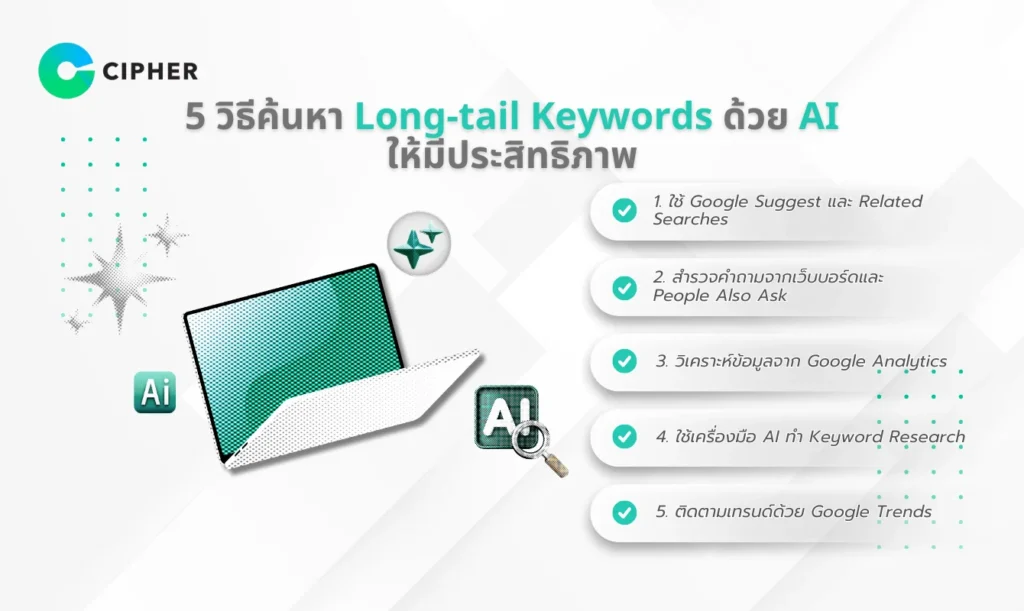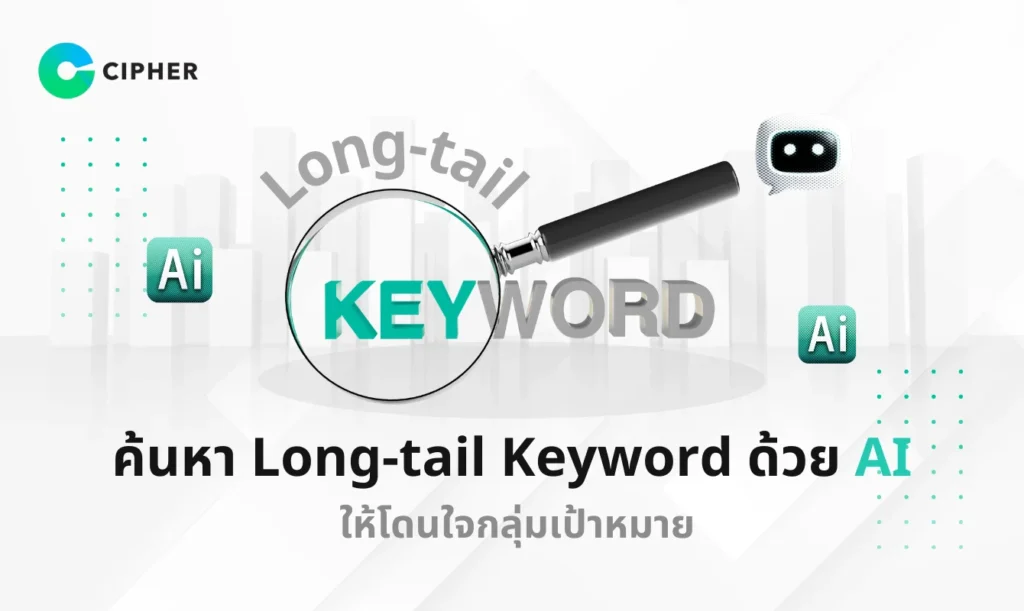SEO in 2025 is no longer just about stuffing keywords into articles and hoping to rank on the first page. With Google’s algorithm changing significantly, learning to find long-tail keywords with AI has become essential for everyone doing SEO. This approach helps understand user behavior and their genuine needs. Long-tail keywords have become crucial in helping online businesses reach customers more accurately. Today, we’ll explore how to effectively discover these valuable keywords that will make your content resonate with your target audience and rank higher on Google!
Table of Contents
What Are Long-Tail Keywords? Why Are They Important for SEO?

Long-tail keywords are phrases that are longer and more specific than general keywords. They typically consist of 3 or more words. For example, if the main keyword is “shoes,” long-tail keywords might be “women’s discounted sneakers” or “how to clean white sneakers.” Using AI to identify these phrases will help you discover terms that best match your target audience’s needs.
Long-tail keywords are important for SEO strategy because:
- They’re easier to rank for: There’s less competition than for main keywords that many businesses target. AI tools help you identify terms with high potential to rank well on Google
- They target specific audiences: People who use long-tail keywords usually know what they want and are more likely to become customers.
- They increase conversion rates: Users searching with specific phrases often have clear intentions (like wanting to buy or seeking specific information). This makes them easier to convert into customers.
- They save on advertising costs: For those doing Google Ads, long-tail keywords have lower CPCs (Cost Per Click) due to less competition.
Although long-tail keywords have fewer searches than main keywords, when combined, they become a source of high-quality traffic and help increase sales effectively. AI tools streamline the discovery process, making it much faster and more efficient.
Who Should Use AI for Long-tail Keyword Research?
The strategy of leveraging AI for keyword research is suitable for many groups, especially:
- Small to medium business owners: With limited budgets who can’t compete with large companies for main keywords. AI-powered research helps small businesses target specific markets.
- Online stores: Looking to increase sales of niche products. AI identifies keywords related to specific products with high purchase intent.
- Content creators: Who need to create material that meets target audience needs and improves ranking opportunities.
- New bloggers: Just starting out and wanting to build traffic gradually.
- Businesses with specialized products or services: Because specific keywords help reach people searching for very particular items.
- New online entrepreneurs: Who aren’t SEO experts yet. AI-based keyword research reduces complexity and saves time.
No matter what business you’re in, if you want effective SEO fundamentals that reach customers with high purchase potential, implementing AI-powered keyword research is a strategy worth pursuing.
Why Google Loves Long-Tail Keywords
Google wants to display search results that best match users’ needs. AI-powered keyword research helps you understand what users are looking for in depth. Google uses E-E-A-T principles (Experience, Expertise, Authoritativeness, Trustworthiness) to rank websites. Using long-tail keywords appropriately helps:
- Websites have content that matches what users really want
- Google better understands the context and intent of your content
- Users get the specific information they’re seeking
This is why adopting AI for keyword research helps improve your SEO efficiency and overall search performance.
AI and Long-Tail Keywords: Essential Tools in 2025
In an era where AI plays a role in every industry, using it for keyword research has become necessary for marketers and business owners. AI can analyze vast amounts of data and help understand user search behavior in depth.
Several AI tools help identify valuable keywords, ranging from free to professional levels, including:
- Semrush: Comprehensive for keyword research, competitor analysis, and traffic monitoring
-
Ahrefs for keyword research:
Excellent for backlink analysis and keyword difficulty assessment
- Ubersuggest: Suitable for beginners, easy to use and affordable
- Google Keyword Planner: Free tool from Google for planning ads and finding keywords
- Keyword Tool Dominator: Has a large, frequently updated database
AI not only helps discover keywords but can also analyze in-depth data such as search trends, competition levels, and CPC values. This helps you identify the most effective phrases for your specific niche.
5 Ways to Efficiently Find Long-tail Keywords with AI

1. Use Google Suggest and Related Searches
Google has an impressive search suggestion feature. When you start typing in the search box, Google suggests terms that others commonly use. Here’s how to utilize this method:
- Type in a main keyword related to your business (but don’t press Enter)
- Look at the suggestions that appear—these are phrases that real people are searching for
- Scroll to the bottom of the search results page to see the “Searches related to…” section
This technique is simple but highly effective as it’s based on actual search data. Modern AI for SEO tools automate this process and deliver results much faster.
2. Explore Questions from Forums and "People Also Ask"
People often express their real needs in the form of questions. You can discover valuable keywords from:
- Forums like Pantip, Reddit, or Quora
- The “People Also Ask” section on Google
- Facebook groups or communities related to your business
Search for questions about your products or services and note what words or phrases people use. These are high-quality keywords that resonate with your target audience.
3. Analyze Data from Google Analytics
If you already have a website, Google Analytics is a goldmine for keyword research:
- “Acquisition” “Search Console” “Queries”>
> - Look at the search terms that bring people to your site
- Identify phrases with high impressions but low clicks (these are golden opportunities!)
Using Analytics data shows you where to focus and how to improve your content to better meet user needs.
4. Use Specialized AI Tools for Keyword Research
Modern AI tools can do the heavy lifting by analyzing:
- Search volume
- Keyword difficulty
- Relevance to your business
- Seasonal trends or latest currents
These specialized tools help you identify terms with high ranking potential without needing to experiment yourself.
5. Track Trends with Google Trends
Google Trends is a powerful tool for viewing search patterns:
- Enter your business’s main keywords
- Look at trends over time
- See related and trending search terms
- Compare multiple keywords to see which ones are gaining momentum
Using Google Trends along with AI helps you discover trending keywords before your competitors do!
Techniques for Using Long-Tail Keywords Most Effectively
Finding valuable keywords is just the beginning. What’s important is how you use them. Here are techniques to help you implement keywords effectively:
- Focus on business relevance first: Choose keywords directly related to your products or services, regardless of search volume
- Consider competition difficulty: Select phrases with low to medium Keyword Difficulty (KD) for better ranking opportunities
- Place keywords in key positions: Include them in Title, Meta Description, H1, URL, and image Alt Text
- Distribute keywords appropriately: Avoid excessive keyword stuffing; consider a balanced keyword density
- Create high-quality content: Develop material that’s useful, easy to read, and thoroughly answers readers’ questions
Creating long-form content of 1,000+ words with a clear table of contents will help your content rank better. It will also fully address readers’ needs. AI-powered research also helps identify subtopics that should be covered in your article.
The Future of Long-Tail Keyword Research with AI in 2025
In 2025, AI technology will continue to evolve. Using it for keyword research will bring significant changes to the SEO industry:
- Deeper understanding of Search Intent: AI will comprehend not just search terms, but users’ true needs
- Personalized Search: Google will increasingly display search results tailored to each individual
- Voice Search: This will play a bigger role, making natural-sentence keywords more important
- AI-Generated Content: There will be more AI-created material, but quality content that provides real value remains essential
Businesses that adapt and embrace AI-powered keyword strategies will gain a significant competitive advantage in the evolving digital landscape.
Long-Tail Keyword Search and Analysis Services with AI
Professional digital agencies like CIPHER specialize in using AI to discover powerful keywords for your business. These services typically cover all aspects:
- In-depth keyword analysis: Using AI to identify and analyze the most suitable phrases for your business
- Targeted content strategy: Planning content that addresses both specific keywords and target audience needs
- On-page SEO optimization: Optimizing your website to efficiently support your keyword strategy
- Performance tracking: Analyzing SEO results and continuously improving
- Long-term content planning: Developing content that covers various valuable keywords to increase traffic
With expert web development services and Digital Marketing teams, AI-powered keyword research will help your business stay ahead of competitors.





